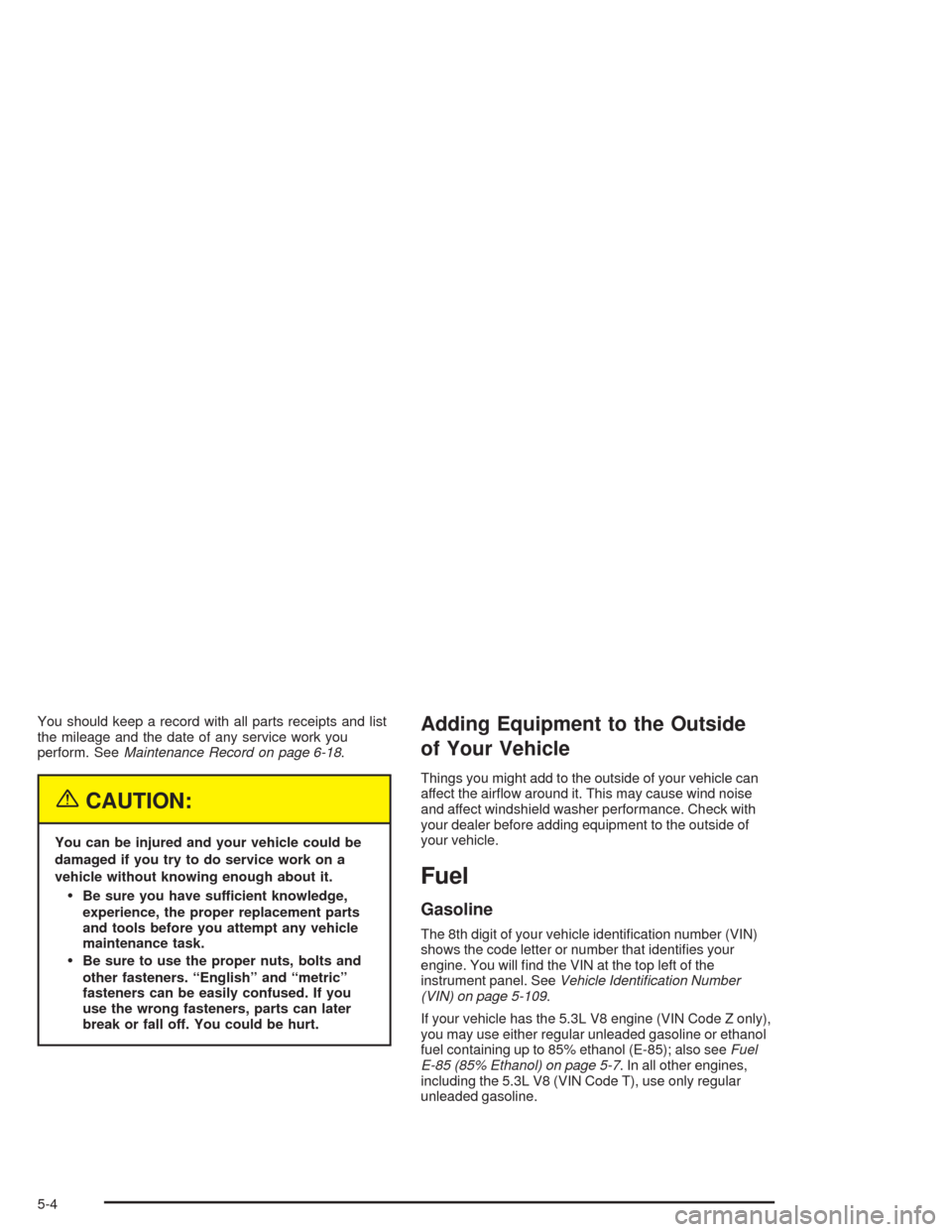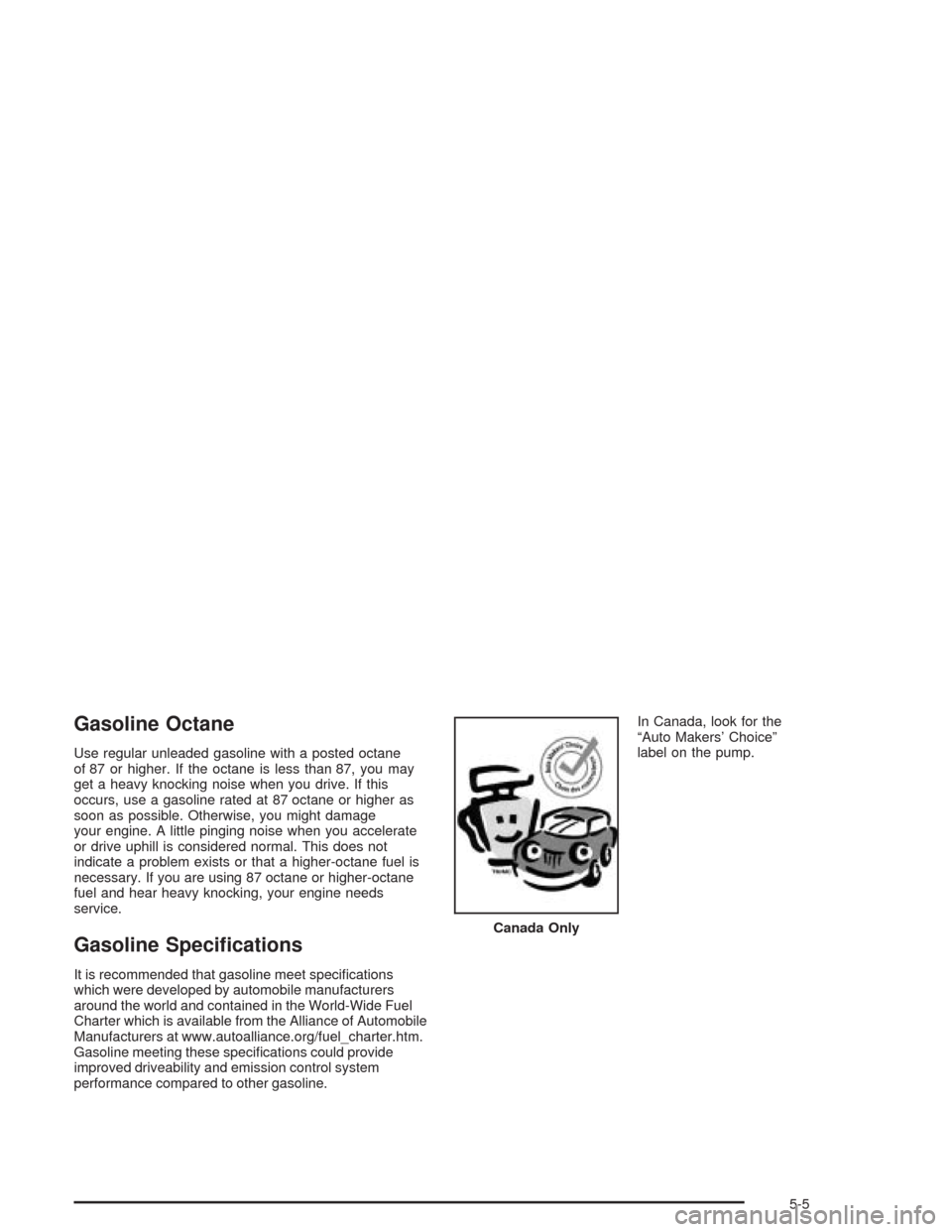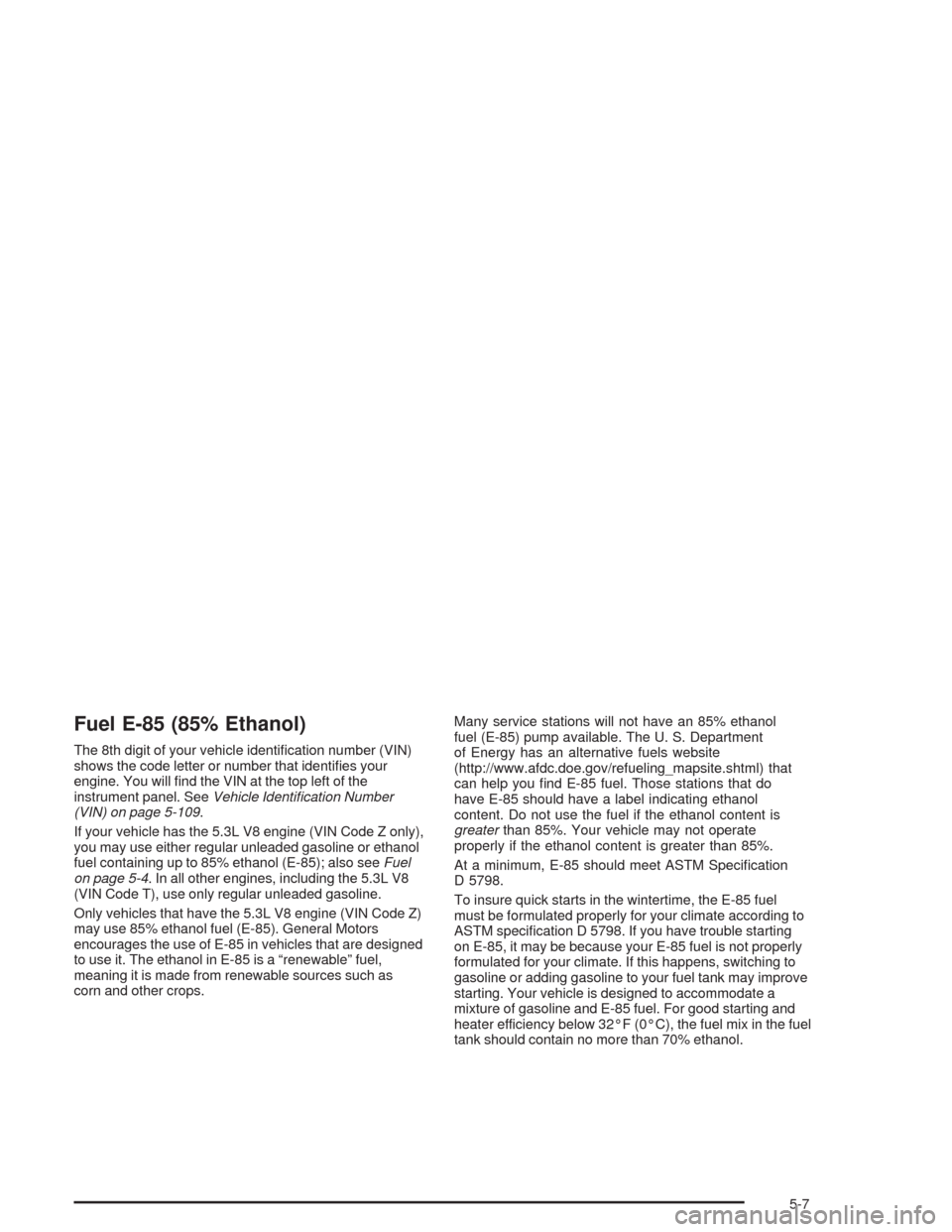Page 390 of 556

You should keep a record with all parts receipts and list
the mileage and the date of any service work you
perform. SeeMaintenance Record on page 6-18.
{CAUTION:
You can be injured and your vehicle could be
damaged if you try to do service work on a
vehicle without knowing enough about it.
Be sure you have sufficient knowledge,
experience, the proper replacement parts
and tools before you attempt any vehicle
maintenance task.
Be sure to use the proper nuts, bolts and
other fasteners. “English” and “metric”
fasteners can be easily confused. If you
use the wrong fasteners, parts can later
break or fall off. You could be hurt.
Adding Equipment to the Outside
of Your Vehicle
Things you might add to the outside of your vehicle can
affect the air�ow around it. This may cause wind noise
and affect windshield washer performance. Check with
your dealer before adding equipment to the outside of
your vehicle.
Fuel
Gasoline
The 8th digit of your vehicle identi�cation number (VIN)
shows the code letter or number that identi�es your
engine. You will �nd the VIN at the top left of the
instrument panel. SeeVehicle Identi�cation Number
(VIN) on page 5-109.
If your vehicle has the 5.3L V8 engine (VIN Code Z only),
you may use either regular unleaded gasoline or ethanol
fuel containing up to 85% ethanol (E-85); also seeFuel
E-85 (85% Ethanol) on page 5-7. In all other engines,
including the 5.3L V8 (VIN Code T), use only regular
unleaded gasoline.
5-4
Page 391 of 556

Gasoline Octane
Use regular unleaded gasoline with a posted octane
of 87 or higher. If the octane is less than 87, you may
get a heavy knocking noise when you drive. If this
occurs, use a gasoline rated at 87 octane or higher as
soon as possible. Otherwise, you might damage
your engine. A little pinging noise when you accelerate
or drive uphill is considered normal. This does not
indicate a problem exists or that a higher-octane fuel is
necessary. If you are using 87 octane or higher-octane
fuel and hear heavy knocking, your engine needs
service.
Gasoline Speci�cations
It is recommended that gasoline meet speci�cations
which were developed by automobile manufacturers
around the world and contained in the World-Wide Fuel
Charter which is available from the Alliance of Automobile
Manufacturers at www.autoalliance.org/fuel_charter.htm.
Gasoline meeting these speci�cations could provide
improved driveability and emission control system
performance compared to other gasoline.In Canada, look for the
“Auto Makers’ Choice”
label on the pump.
Canada Only
5-5
Page 392 of 556

California Fuel
If your vehicle is certi�ed to meet California Emission
Standards (see the underhood emission control label),
it is designed to operate on fuels that meet California
speci�cations. If this fuel is not available in states
adopting California emissions standards, your vehicle
will operate satisfactorily on fuels meeting federal
speci�cations, but emission control system performance
may be affected. The malfunction indicator lamp may turn
on (seeMalfunction Indicator Lamp on page 3-50) and
your vehicle may fail a smog-check test. If this occurs,
return to your authorized GM dealer for diagnosis. If it is
determined that the condition is caused by the type of fuel
used, repairs may not be covered by your warranty.
Additives
To provide cleaner air, all gasolines in the United States
are now required to contain additives that will help
prevent engine and fuel system deposits from forming,
allowing your emission control system to work properly.
You should not have to add anything to your fuel.
However, some gasolines contain only the minimum
amount of additive required to meet U.S. Environmental
Protection Agency regulations. General Motors
recommends that you buy gasolines that are advertised
to help keep fuel injectors and intake valves clean.If your vehicle experiences problems due to dirty injectors
or valves, try a different brand of gasoline.
Gasolines containing oxygenates, such as ethers and
ethanol, and reformulated gasolines may be available in
your area to contribute to clean air. General Motors
recommends that you use these gasolines, particularly if
they comply with the speci�cations described earlier.
Notice:Your vehicle was not designed for fuel that
contains methanol. Do not use fuel containing
methanol. It can corrode metal parts in your fuel
system and also damage the plastic and rubber parts.
That damage would not be covered under your
warranty.
Some gasolines that are not reformulated for low
emissions may contain an octane-enhancing additive
called methylcyclopentadienyl manganese tricarbonyl
(MMT); ask the attendant where you buy gasoline
whether the fuel contains MMT. General Motors does
not recommend the use of such gasolines. Fuels
containing MMT can reduce the life of spark plugs and
the performance of the emission control system may
be affected. The malfunction indicator lamp may turn on.
If this occurs, return to your authorized GM dealer for
service.
5-6
Page 393 of 556

Fuel E-85 (85% Ethanol)
The 8th digit of your vehicle identi�cation number (VIN)
shows the code letter or number that identi�es your
engine. You will �nd the VIN at the top left of the
instrument panel. SeeVehicle Identi�cation Number
(VIN) on page 5-109.
If your vehicle has the 5.3L V8 engine (VIN Code Z only),
you may use either regular unleaded gasoline or ethanol
fuel containing up to 85% ethanol (E-85); also seeFuel
on page 5-4. In all other engines, including the 5.3L V8
(VIN Code T), use only regular unleaded gasoline.
Only vehicles that have the 5.3L V8 engine (VIN Code Z)
may use 85% ethanol fuel (E-85). General Motors
encourages the use of E-85 in vehicles that are designed
to use it. The ethanol in E-85 is a “renewable” fuel,
meaning it is made from renewable sources such as
corn and other crops.Many service stations will not have an 85% ethanol
fuel (E-85) pump available. The U. S. Department
of Energy has an alternative fuels website
(http://www.afdc.doe.gov/refueling_mapsite.shtml) that
can help you �nd E-85 fuel. Those stations that do
have E-85 should have a label indicating ethanol
content. Do not use the fuel if the ethanol content is
greaterthan 85%. Your vehicle may not operate
properly if the ethanol content is greater than 85%.
At a minimum, E-85 should meet ASTM Speci�cation
D 5798.
To insure quick starts in the wintertime, the E-85 fuel
must be formulated properly for your climate according to
ASTM speci�cation D 5798. If you have trouble starting
on E-85, it may be because your E-85 fuel is not properly
formulated for your climate. If this happens, switching to
gasoline or adding gasoline to your fuel tank may improve
starting. Your vehicle is designed to accommodate a
mixture of gasoline and E-85 fuel. For good starting and
heater efficiency below 32°F (0°C), the fuel mix in the fuel
tank should contain no more than 70% ethanol.
5-7
Page 395 of 556
Filling Your Tank
{CAUTION:
Fuel vapor burns violently and a fuel �re can
cause bad injuries. To help avoid injuries to
you and others, read and follow all the
instructions on the pump island. Turn off your
engine when you are refueling. Do not smoke
if you are near fuel or refueling your vehicle.
Keep sparks, �ames and smoking materials
away from fuel. Do not leave the fuel pump
unattended when refueling your vehicle — this
is against the law in some places. Keep
children away from the fuel pump; never let
children pump fuel.
The fuel cap is located behind a hinged door on the
driver’s side of the vehicle.To remove the fuel cap, turn it slowly to the left
(counterclockwise). It will require more effort to turn the
fuel cap on the last turn as you loosen it.
Before refueling, slide the edge of the fuel cap onto the
�ller door hook.
5-9
Page 398 of 556
Checking Things Under
the Hood
{CAUTION:
Things that burn can get on hot engine parts
and start a �re. These include liquids like fuel,
oil, coolant, brake �uid, windshield washer and
other �uids, and plastic or rubber. You or
others could be burned. Be careful not to drop
or spill things that will burn onto a hot engine.
Hood Release
To open the hood do the following:
1. Pull the handle inside
the vehicle located
under and to the left of
the steering wheel.
5-12
Page 400 of 556
Engine Compartment Overview
When you open the hood on the VORTEC™ 5300 V8 engine (VORTEC™ 4800 and 6000 V8 engines similar),
you’ll see the following:
5-14
Page 401 of 556
A. Engine Air Cleaner/Filter. SeeEngine Air
Cleaner/Filter on page 5-22.
B. Coolant Surge Tank. SeeCooling System on
page 5-32.
C. Air Filter Restriction Indicator (If Equipped). See
Engine Air Cleaner/Filter on page 5-22.
D. Engine Oil Dipstick. SeeEngine Oil on page 5-17.
E. Automatic Transmission Dipstick. SeeAutomatic
Transmission Fluid on page 5-24.
F. Engine Oil Fill. SeeEngine Oil on page 5-17.
G. Fan. SeeCooling System on page 5-32.
H. Remote Negative (−) Terminal (GND). SeeJump
Starting on page 5-44.I. Power Steering Fluid Reservoir. SeePower Steering
Fluid on page 5-38.
J. Remote Positive (+) Terminal. SeeJump Starting on
page 5-44.
K. Brake Master Cylinder Reservoir. SeeBrakes on
page 5-40.
L. Underhood Fuse Block. SeeFuses and Circuit
Breakers on page 5-110.
M. Battery. SeeBattery on page 5-44.
N. Windshield Washer Fluid Reservoir. SeeWindshield
Washer Fluid on page 5-39.
5-15